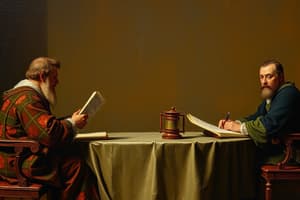Podcast
Questions and Answers
Which case limited Congress's power under the Commerce Clause?
Which case limited Congress's power under the Commerce Clause?
- Brown v. Board of Education
- Filburn
- United States v. Lopez (correct)
- McCulloch v. Maryland
What authority does the Necessary and Proper Clause grant to Congress?
What authority does the Necessary and Proper Clause grant to Congress?
- To regulate all activities affecting local businesses.
- To pass laws necessary to carry out enumerated powers. (correct)
- To impose taxes without limitation.
- To create laws explicitly mentioned in the Constitution.
What does the Due Process Clause protect against?
What does the Due Process Clause protect against?
- State taxation on federal entities.
- Unjust laws passed by federal legislators.
- Discrimination based on gender or race.
- Government deprivation of property without fair procedures. (correct)
Which case ruled that racial segregation in public schools violated the Equal Protection Clause?
Which case ruled that racial segregation in public schools violated the Equal Protection Clause?
Which of the following is a key aspect of the Equal Protection Clause?
Which of the following is a key aspect of the Equal Protection Clause?
What is the primary purpose of judicial review?
What is the primary purpose of judicial review?
Which Supreme Court case established the principle of judicial review?
Which Supreme Court case established the principle of judicial review?
What does federalism entail?
What does federalism entail?
What landmark case ruled that the federal government holds supreme power in matters of interstate commerce?
What landmark case ruled that the federal government holds supreme power in matters of interstate commerce?
Which principle prevents any one branch of government from becoming too powerful?
Which principle prevents any one branch of government from becoming too powerful?
In what way did the case Youngstown Sheet & Tube Co. v. Sawyer impact presidential power?
In what way did the case Youngstown Sheet & Tube Co. v. Sawyer impact presidential power?
What is a notable feature of the Commerce Clause in the Constitution?
What is a notable feature of the Commerce Clause in the Constitution?
How has the interpretation of the Commerce Clause changed over time?
How has the interpretation of the Commerce Clause changed over time?
Flashcards are hidden until you start studying
Study Notes
Judicial Review
- Judicial review is the power of courts to examine the actions of the legislative and executive branches to determine if they align with the Constitution.
- Established by Marbury v. Madison (1803).
- Chief Justice John Marshall asserted the role of the judiciary as the interpreter of the law.
- Judicial review allows the Supreme Court to declare laws and actions unconstitutional.
- The power of judicial review is not explicitly stated in the Constitution but has been inferred by the Court.
Federalism
- Federalism divides power between the federal government and state governments.
- The Constitution grants specific powers to the federal government (enumerated powers) and reserves other powers to the states (10th Amendment).
- Key cases in federalism include McCulloch v. Maryland (1819) which upheld the implied powers of Congress and affirmed the supremacy of federal law.
- Gibbons v. Ogden (1824) dealt with the Commerce Clause, confirming Congress's power to regulate interstate commerce.
Separation of Powers
- Separation of powers divides government functions into three branches: legislative, executive, and judicial.
- Each branch has distinct powers and responsibilities to prevent any one branch from becoming too powerful.
- Checks and balances enable each branch to limit the powers of others. Example: the president can veto legislation, Congress can override vetoes, and courts can declare laws unconstitutional.
- Youngstown Sheet & Tube Co.v. Sawyer (1952) limited executive power by ruling that President Truman could not seize steel mills without congressional authorization.
Commerce Clause
- The Commerce Clause (Article I, Section 8, Clause 3) grants Congress the power to regulate commerce with foreign nations, states, and Indian tribes.
- The interpretation of the Commerce Clause has evolved over time, reflecting different views on federal power.
- Wickard v. Filburn (1942) expanded Congress's power under the Commerce Clause, allowing regulation of local activities affecting interstate commerce.
- United States v. Lopez (1995) limited Congress's power under the Commerce Clause, ruling that the Gun-Free School Zones Act went beyond federal authority.
Necessary and Proper Clause
- The Necessary and Proper Clause (Article I, Section 8, Clause 18) grants Congress the authority to create laws necessary to carry out its enumerated powers.
- McCulloch v. Maryland found that Congress had implied powers, and creating a national bank was within Congress's authority.
- The clause has been used to justify federal legislation that is not explicitly mentioned in the Constitution, but seen as necessary to achieve federal objectives.
Due Process and Equal Protection
- The Due Process Clause and Equal Protection Clause are part of the 14th Amendment.
- The Due Process Clause prohibits the government from depriving individuals of life, liberty, or property without fair procedures.
- The Equal Protection Clause requires states to provide equal protection under the law for everyone within their jurisdiction.
- Brown v. Board of Education (1954) ruled that racial segregation in public schools violated the Equal Protection Clause.
- Plessy v. Ferguson was overturned by Brown v. Board of Education.
Studying That Suits You
Use AI to generate personalized quizzes and flashcards to suit your learning preferences.




